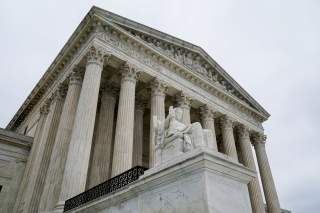The Supreme Court Might Strike A Big Blow Against Labor Unions
Could 'exclusive representation' be on the chopping blocK?
Labor unions have always had a difficult time with those who don’t want the union’s representation. Those who crossed the picket line or those who were hired during a strike were called “scabs,” and unions sometimes employed violence or threats of violence against those who didn’t follow the union’s commands. One solution to this problem was the system of exclusive representation. Under exclusive representation, which was established by the National Labor Relations Act of 1935, if a majority of workers in a bargaining unit vote for a union, then that union becomes the exclusive representative for all the workers, even those who didn’t vote for it. Thereafter, workers are prohibited from bargaining on their own behalf.
Although exclusive representation is held up by some as a cornerstone of unionism, it is an antiquated practice that has many critics among labor union supporters. Union organizers and labor activists have written that exclusive representation was “designed to fit the immobile facilities and monolithic corporations that were at the heart of Fordist mass production, the system makes little sense in today’s world of fissured workplaces and flexible production.” Moreover, after the Supreme Court’s decision in Janus v. AFSCME, public‐sector unions are no longer allowed to compel payments from nonmembers. Yet they still exclusively represent those nonmembers and owe a “duty of fair representation” even to those who aren’t contributing.
It was thus no surprise that, after Janus, many people thought representation would be next on the Supreme Court’s chopping block, and a new case is asking the Court to extend its ruling in Janus to exclusive representation.
Under Maine law, public employees are compelled to associate with and speak through a state‐designated labor union for collective bargaining and other related purposes. Under these exclusive representation schemes, state‐designated unions are recognized as public employees’ “sole and exclusive bargaining agents.” Jonathan Reisman is a professor of economics at the University of Maine at Machias, and he has left his designated union, the Associated Faculties of the University of Maine (AFUM). Professor Reisman strongly opposes the union speaking on his behalf yet is still forced to accept the union as his representative.
The Supreme Court recognized in Janus that exclusive representation inflicts a “significant impingement on associational freedoms that would not be tolerated in other contexts.” After all, exclusive representation creates an unwelcome agency relationship between the union and dissenting nonmembers. The union is essentially granted a monopoly on all work‐related expressive association, meaning employees can’t forgo union representation or choose another representative. And exclusive representative status means that any position the union takes during collective bargaining is imputed to all the bargaining unit employees, including those who disagree with its positions. Professor Reisman opposes many positions the AFUM has taken on issues involving “wages, hours, and conditions of employment.” The AFUM, through support of the Maine Education Association has even spoken out on controversial political matters, including issuing endorsements for public office and lobbying the state on various policy issues. And because unions with exclusive representative status negotiate one‐size‐fits‐all contracts for all employees, they deny employees a chance to negotiate directly with their employer to develop contracts that fit their individual situations.
The Supreme Court has long recognized that freedom of association presupposes a freedom not to associate. Yet, in the labor context, the courts have been reluctant to subject public unions to any degree of constitutional scrutiny because of states’ purported interest in promoting “labor peace.” But whatever may have been the case in the early days of the labor movement, “labor peace” can now be achieved through means significantly less restrictive of associational freedoms. Exclusive representation simply can’t be justified by any state interest, let alone a compelling one, that would validate the serious impingements it imposes on dissenting nonmembers’ associational rights. Put plainly, there is no labor law exception to the First Amendment, and labor laws that violate constitutional principles must be held to heightened judicial scrutiny.
Professor Reisman lost in the court of appeals. Now on petition to the Supreme Court, the Cato Institute has filed a brief in support of Professor Reisman’s petition, arguing that exclusive representation regimes like Maine’s are unconstitutional violations of union nonmembers’ associational and free speech rights. The Court has a chance to finally set the record straight by reaffirming associational rights in the labor context and clarify once and for all that public employees don’t leave their constitutional rights at the workplace door.
This article first appeared in CATO.
Image: Reuters.

